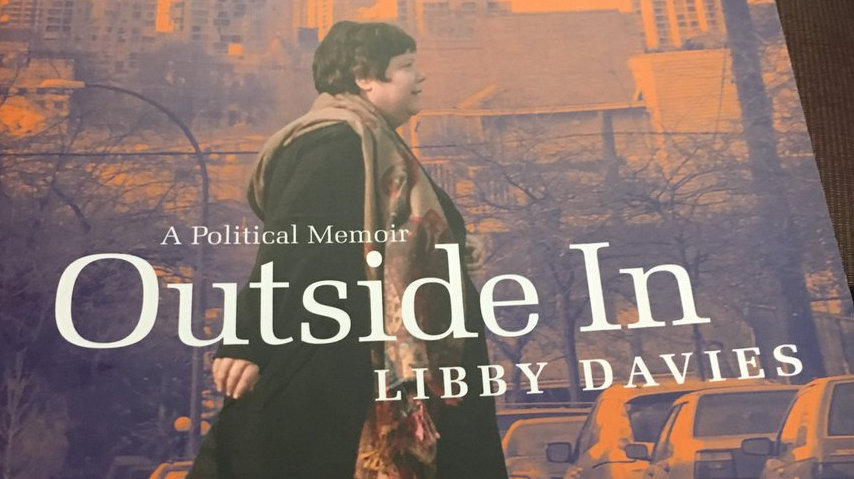Outside In, A Political Memoir, by Libby Davies, published by Between The Lines, 320 pages.
When the realization hit a few years ago that a big shake-up was inevitable at Vancouver City Hall, the conversation among progressives turned to the big question: who should run for mayor after Vision’s Gregor Robertson? Hands down, the popular favourite was Libby Davies, who had recently retired after 18 years as the NDP MP for Vancouver East.
It must have been tempting for Davies to contemplate being mayor of the city where she began her activist and political career while still a teenager, just a few years after her family emigrated from England. But as this memoir makes clear, she wasn’t prepared to return to the electoral arena, mostly for personal reasons.
Anyone who thinks that being a progressive elected politician is a cushy job should read this book, which gives a pretty accurate look at how things work, from the grassroots level, up to municipal politics and then Parliament. Libby Davies got into the fight to improve the lives of poor, working class people in Vancouver, joining the Downtown Eastside Residents Association (DERA). By the age of 20 she was a rising star among a group of dynamic community organizers. One of the people she drew into DERA was a much older Bruce Eriksen, who had a reputation for raising hell about terrible conditions in the rooming houses and bars along East Hastings Street.
Davies’ description of the early struggles of DERA and the growth of the Committee of Progressive Electors (COPE) into a strong political contender is fascinating. So is the tender depiction of her relationship with Eriksen, despite the objections of some who thought he must be “exploiting” her. Starting in 1982, the two were elected to several terms on Vancouver City Council, becoming a powerful political team until his tragic death from cancer in 1997. Later that year, still suffering from this loss, Davies was elected the NDP MP in Vancouver East.
It wasn’t the last time Davies ignored conventions, as she did later in Ottawa, surprising herself by courageously speaking in Parliament about her relationship with a woman (her partner Kim Elliott), during the debates over equal marriage rights.
Through it all, Libby Davies won a strong reputation for speaking the truth without fear and putting the interests of working people first. “Outside In” describes several issues where she followed her own path, despite the potential of negative political consequences. These included the long, tough struggle to treat drug addictions as a medical issue, not a matter for law enforcement; her support for efforts to decriminalize sex work; and her principled solidarity with the Palestinian struggle against Israeli occupation of their homelands.
In each case, Davies ran into opposition within her own party, especially around the Palestine issue, including from Jack Layton and particularly his successor, Tom Mulcair. A loyal NDPer, Davies describes how she kept her party’s unity as a top priority, but also candidly shares with readers some of the inside story of these bitter struggles.
This reviewer first met Davies while volunteering on her unsuccessful campaign for mayor in 1993. Four years later, I was the Communist candidate in Van East, gaining new respect for her incredible ability to connect with people in the community. As a sometime political organizer and frequent candidate, I can say without hesitation that this is an important book for people on the left to read, not least for her discussions of how the NDP leadership functions.
However (and there are always “howevers”), I do have one sizable quibble. Like the otherwise very useful 1993 book “COPE: 1968-1993, Working for Vancouver”, “Outside In” omits any mention of the Communist Party. I say this not out of sectarian pique, but because the Communist Party was the single most important political force behind the formation of COPE and its early political progress, a story that Davies knows well.
Many Communists ran as COPE candidates over the decades, and a large number were elected to Council, School Board and Park Board. The tendency to ignore this record is one factor behind the internecine fractures that damaged COPE in later years, although it recovered to elect several candidates in the 2018 civic campaign.
Whether intentionally or not, those who write the Communist Party out of the record do a disservice to the struggle for socialist change in Canada. That’s an unfortunate flaw in this very powerful book.




